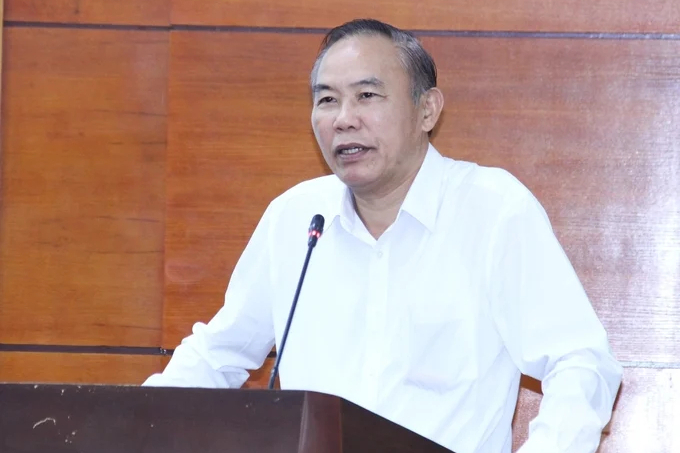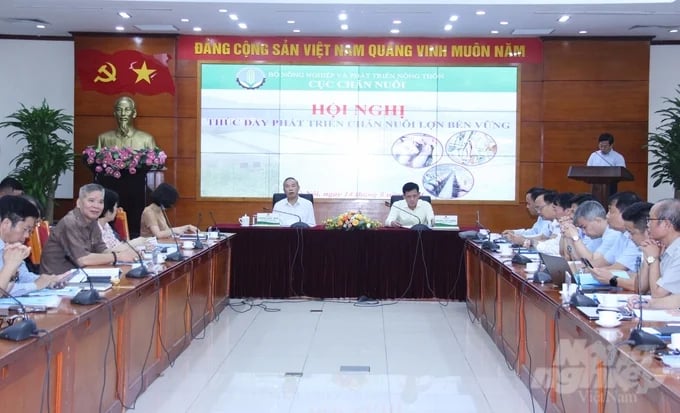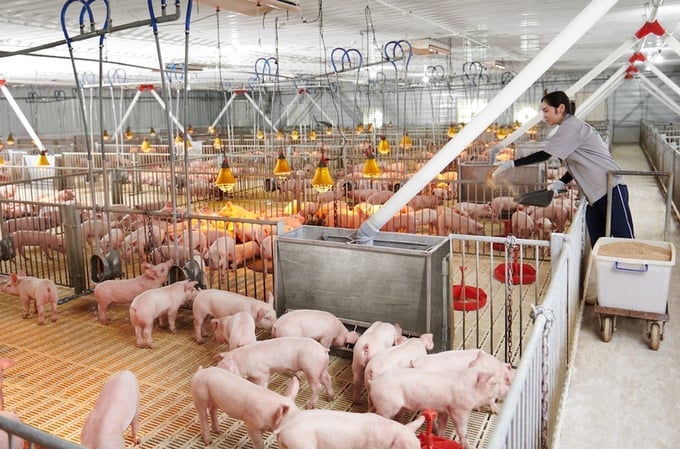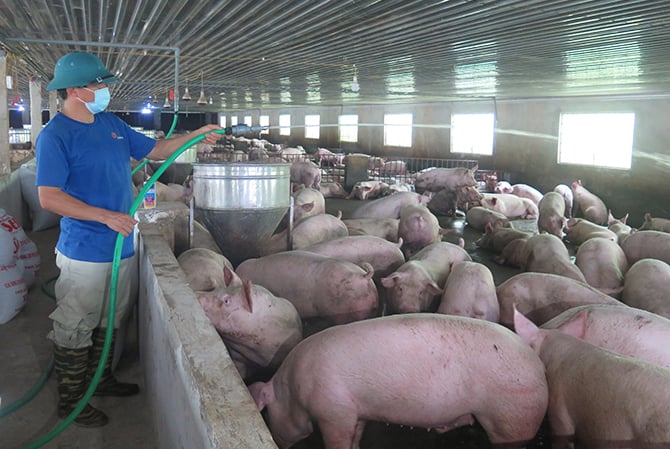June 19, 2025 | 02:29 GMT +7
June 19, 2025 | 02:29 GMT +7
Hotline: 0913.378.918
June 19, 2025 | 02:29 GMT +7
Hotline: 0913.378.918

Mr. Phung Duc Tien: To develop pig farming, it is necessary to strengthen the prevention and combat of pig smuggling across the border. Photo: Trung Quan.
At the Conference on promoting sustainable pig farming development on the morning of August 14, Mr. Pham Kim Dang, Deputy Director of the Department of Livestock Production, informed that the total number of pigs in the country as of the end of June 2024 is estimated at more than 25 million, an increase of 2.9% compared to the same period in 2023.
In the first six months of the year, the output of live pigs for slaughter is estimated at 2.5 million tons, an increase of 5.1% compared to the same period in 2023. The total herd of sows is currently stable at about 3 million.
Pig farming has shifted towards reducing small-scale household farming and increasing professional farming households and large-scale farms. In the past five years, the rate of household farming has decreased by 5-7% per year. In 2019-2022, small-scale farming facilities on a household scale decreased by 15-20%.
Currently, the output of pigs produced in small-scale households has decreased to 35-40%, and the production of pigs produced in professional households and farms accounts for 60-65%.
According to Mr. Dang, besides favorable factors, pig farming still faces many difficulties, such as biosecurity farming and disease control needing to be implemented synchronously. The professionalism in pig farming of small and medium-sized households and farms has yet to be improved, and production costs are still high.
Centralized and industrial slaughter cannot compete with small-scale slaughter, leading to a significant difference in the selling prices of farmers.
Pig farming still depends heavily on imported inputs such as high-quality breeding animals, especially animal feed ingredients. Globalization of the market significantly impacts supply chains, and competition for livestock products is increasingly tense.

Many delegates suggested that there should be specific regulations to manage animal quarantine work strictly. Photo: Trung Quan.
Mr. Phan Quang Minh, Deputy Director of the Department of Animal Health, said that in 2024, the country had 863 outbreaks of African swine fever in 46 provinces and cities, with more than 57,000 pigs infected, dead and culled. There were three outbreaks of foot-and-mouth disease nationwide. The number of pigs infected was 86, and the number of pigs dead and culled was 43.
Vietnam currently records 970 facilities in 55 localities certified as safe for African swine fever, foot-and-mouth disease, blue ear disease, and leptospirosis. Of these, 938 facilities and 32 disease-free areas.
However, slaughter control and veterinary hygiene inspection still face many difficulties. Local authorities have yet to pay due attention, especially the People's Committees at the district and commune levels.
It is difficult to attract investors to build centralized slaughterhouses or have many small-scale slaughterhouses in parallel. At the same time, the investment costs are significant, the capital recovery time is slow, the investment is hazardous, and many localities have low consumption demand.
In addition, the livestock and veterinary management agencies in localities are in turmoil, causing difficulties and inadequacies in operations. There is still a situation of illegal slaughter after the construction and operation of centralized slaughterhouses. The number of animals slaughtered at centralized slaughterhouses only reaches about 40-50% of the designed capacity.
Mr. Nguyen Dinh Xuan, Director of the Tay Ninh Department of Agriculture and Rural Development, suggested that the current conflict between the construction of livestock farms and residential areas still needs to be resolved.
Many farms, when built, have complied with regulations to ensure distance from residential areas (500m). However, there are no regulations that state that people around the farm are not allowed to develop houses within 500m, which has led to the situation where people's homes are getting closer and closer to the farming area, and then they complain about the bad smell from the farming area.
When the disease-free zone is recognized, there are no strong regulations to protect it, primarily related to transporting livestock and poultry through the area.

In the first 6 months of 2024, the output of live pigs for slaughter is estimated to reach 2.5 million tons. Photo: Trung Quan.
Mr. Dang Van Minh, Head of the Nghe An Sub-Department Livestock Production & Animal Health, is concerned many livestock farms were approved as large-scale before the Law on Animal Husbandry came into effect.
Still, according to the new regulations, they are assessed as small-scale, which will disadvantage their operations because they have invested much money in construction and development.
In addition, Mr. Minh said that the provincial-level state management unit handles administrative violations according to the Law on Inspection, which leads to a situation where the Sub-Department must be authorized to handle animal husbandry and veterinary medicine cases.
The files must be transferred to other units. Therefore, it is necessary to study and adjust the function of handling administrative violations with the title of Head of Sub-Department to be more timely and effective in management.
Currently, the Law on Animal Health has abolished intra-provincial quarantine. Still, there needs to be a legal document regulating intra-provincial quarantine control by transportation, the primary disease transmission route.

Vietnam is moving towards building a friendly, green agriculture. Photo: Phuong Loan.
Mr. Phung Duc Tien, Deputy Minister of MARD, emphasized that there is little time left until Tet. The livestock industry, particularly pig farming, must remove difficulties and prepare the conditions to ensure sufficient, safe, and quality supply.
In the immediate future, we must ensure the supply of sufficient high-yield and high-quality breeds. Every year, we must spend USD 7 billion to import raw materials for animal feed. Therefore, localities and units must immediately develop a plan to proactively source domestic raw materials for animal feed to limit dependence on imported raw materials.
In particular, it is necessary to manage slaughtering and processing strictly in conjunction with ensuring food safety. An alarming reality is that Resolution 43 of the National Assembly, which is implementing legal policies on food safety, has been issued. However, localities still need to be more negligent and superficial.
Centralized slaughterhouses need to be promoted, while small-scale slaughterhouses are increasing. The number of poisoning cases has not increased, but the number of people poisoned in one crop has increased.
In addition, we are moving towards building a friendly, green agriculture, so reducing emissions in pig farming must be controlled. Mr. Tien noted that in the long term, it is necessary to promote the prevention and control of cross-border poultry smuggling in the northern provinces and the smuggling of pigs in the south.
Continue to review imports to ensure compliance with legal regulations and promote the advantages of technical barriers. Functional units focus on directing and supporting businesses and huge companies to boost export activities.
At the same time, the focus should be on effectively implementing five projects approved for the breeding, feed, processing, environment, livestock equipment, human resources, and scientific research in livestock farming.
Translated by Huong Giang
/2025/06/17/3942-2-143243_548.jpg)
(VAN) Recently, in Sweden, the Secretary of the Binh Dinh Provincial Party Committee presented the Investment Registration Certificate for the 'Polyester Fabric Recycling Complex' project to SYRE Impact-AB Company.
/2025/06/12/3721-2-202745_83.jpg)
(VAN) TH made an impression at Seoul Food 2025 with its line of natural beverages, paving the way for Vietnamese food products to enter the South Korean market.

(VAN) Soc Trang's success in rice exports stems from a strategy of developing fragrant and specialty rice cultivation areas and standardizing production toward low-emission practices.
/2025/06/11/1311-5-120811_839.jpg)
(VAN) The pig farming industry is facing the challenge of comprehensive restructuring to meet requirements for quality, safety, traceability, and market expansion both domestically and for export.

(VAN) Vietnam considers participating in ALGROALBA in order to expand agricultural production, coordinate the assessment and effective exploitation potential land.
/2025/06/05/5314-1-184727_407.jpg)
(VAN) From seemingly worthless fish scales and skin, enzymes and lactic ferments can transform by-products into peptides, opening a sustainable, effective business direction and elevating Vietnamese seafood.

(VAN) TTC AgriS and IFC signed a strategic partnership to develop a sustainable agricultural value chain, aiming to achieve the Net Zero target by 2035.